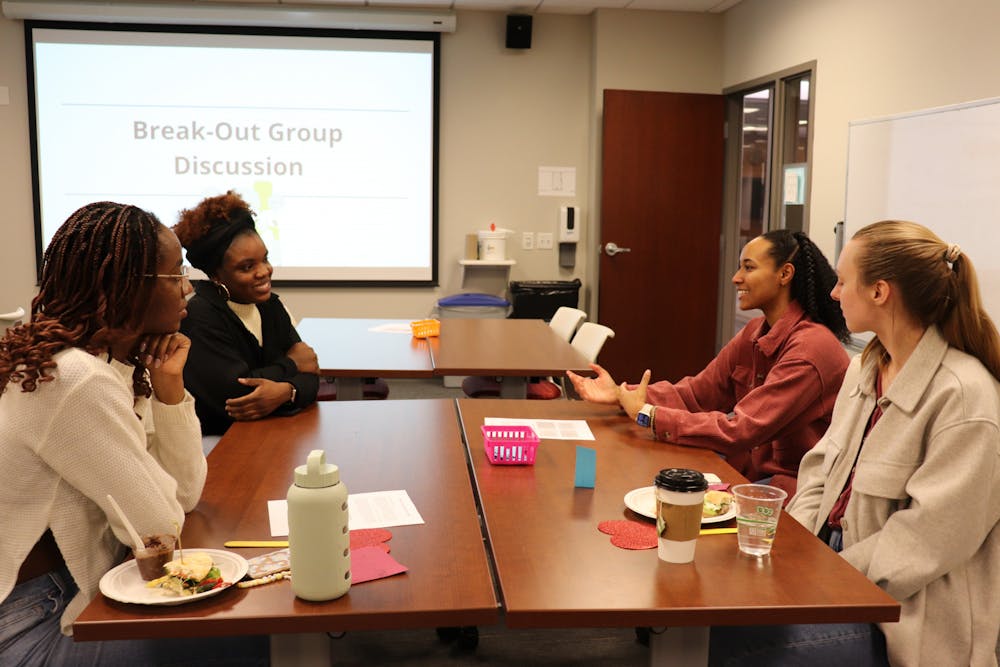Senior Keiarra Bray came back from studying abroad in South Africa and felt isolated. While overseas, Bray said many locals were shocked to see her, a Black woman, sitting and talking alongside her white classmates. With institutional racial segregation taking place in South Africa until the 1990s, Bray said she was subjected to much harsher societal divisions.
Upon coming back to campus, Bray said she looked for available support systems and resources to express and process her experience.
“I just wish there were more opportunities for me to discuss what studying abroad was like for me,” Bray said. “Especially going somewhere for so long and just coming back and expecting to transition back to the culture like everything was normal. … Often I felt like I was a burden when talking to people who didn’t go away because no one truly understands your experience.”
During her Global Civic Rights class abroad, Bray said her professor asked the class to pay attention to when and how often they found themselves in integrated settings. When she came home, Bray said she was also forced to note the similarities and differences of racism in America.
“I feel like in Cape Town, the racism was a bit more blatant than here in America,” Bray said. “Individuals were more opinionated. So they would let you know if they had an issue, where you would get a stare, versus here in America, we kind of wrap it under the surface.”
In both countries, Bray said she noticed “microaggressions” in places of privilege. These are indirect, subtle and sometimes unintended discriminations against a marginalized group.
“I think that applies to the educational system in America in general, because it's not inclusive to diverse perspectives,” Bray said.
On Feb. 13 and 14, Elon’s Global Education Center hosted a two-day seminar for study abroad students who came back to campus and experienced reverse culture shock or had trouble adjusting back to life at Elon.
On each day of the event, three individuals attended and discussed their personal accounts of being abroad, including dating in a foreign country, walking alone at night, incidents of chauvinism and cultural differences in attitude towards women.
All agreed returning home was more of an adjustment than they originally anticipated.
Senior Jess Bell said after coming back from her fall 2021 semester abroad to Sorrento, Italy, Elon felt cold and isolating — attributing declines in mental health to the reverse culture shock.
Senior Morgan Stankiewicz also said she wished she knew of this phenomenon when she came back from her semester in Seville, Spain, during spring 2022, as it would have helped her readjust to Elon.
Bray, who organized the event, said part of the difficulties of discussing emotional topics such as racism is a reluctance to hurt others’ feelings. Bray said intellectual conversations, even with those who have differing points-of-view, can be a step towards inclusion.
“I feel like sometimes in America, we tend to worry a lot about an individual's feelings, and we kind of limit our ability to be able to have these conversations,” Bray said.
For this reason, Bray emphasized that the discussions were open to any and all issues that stem from travel experiences — no matter when one might have traveled.
Supporting Bray’s efforts, Associate Director for Global Diversity and Inclusion Allegra Laing said events like this one allow for everyone to be heard.
“I know that when I studied abroad, in France, I was one of three Black women on the program,” Lang said. “There were similarities in our experiences, my experience with other colleagues, but I moved through the world differently. And so there were differences in how my experience played out compared to some other students on my program.”
Laing said Elon highly promotes the study abroad experience, which leaves her to wonder if there is perception that everyone who goes abroad has a good time.
“I sometimes wonder if it's more challenging for students to then congregate around reentry,” Laing said.
Bray said she wants more events like this in the future to continue to give students the ability to discuss feelings in a safe space.


